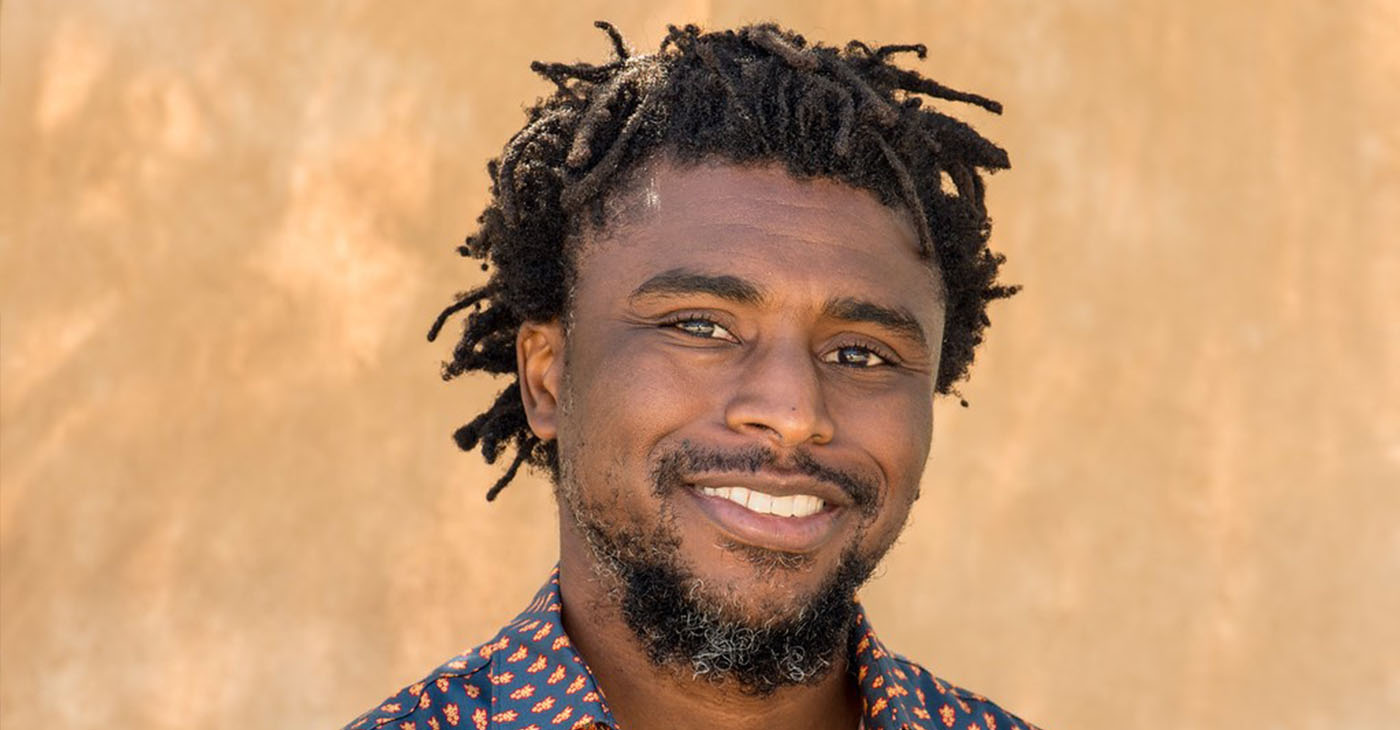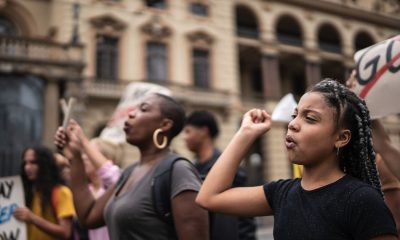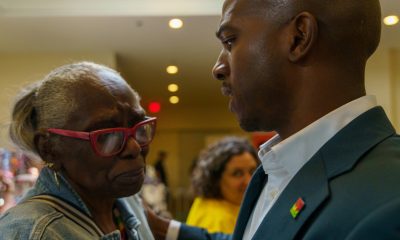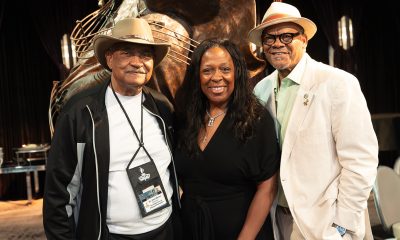Activism
Third Opinion: How My Dad’s Terminal Diagnosis Taught Me the Importance of Self Advocacy
…there I was, sitting in the living room where I was raised, learning from my father that a CAT scan had revealed that the basilar artery that carried blood from his heart to his brain was completely blocked. The diagnosis was that he had mere weeks left to live. The timetable, he confided, seemed inaccurate. “I don’t feel like I’m dying,” he said, hefting my suitcase over his shoulder and walking it upstairs, an exertion that was absolutely against doctor’s orders.

By Keenan Norris, Special to California Black Media Partners
One moment, I was decompressing after my day at work in Oakland, the next I was being called home to Southern California to learn something too serious for telephone conversation. I remember playing the same song for the entire six-hour drive down south.
Then, there I was, sitting in the living room where I was raised, learning from my father that a CAT scan had revealed that the basilar artery that carried blood from his heart to his brain was completely blocked. The diagnosis was that he had mere weeks left to live. The timetable, he confided, seemed inaccurate. “I don’t feel like I’m dying,” he said, hefting my suitcase over his shoulder and walking it upstairs, an exertion that was absolutely against doctor’s orders.
The disconnect between my father’s lived experience and his diagnosis was just one rift that would arise between my family and the medical system. In the weeks that followed, he suffered a series of small strokes, obvious symptoms of occlusion. At the local hospitals we took him to, the staff all but told us he was a dead man.
Unwilling to accept this premature conclusion, my family took it upon ourselves to do what the medical establishment seemed unwilling to do. We fought for my father, pushing for referrals and further tests. And it was because of our family’s advocacy that the terminal diagnosis given to my father was not, in fact, the last word on his life.
Debra Law is a lecturer at The Valley Foundation School of Nursing at San Jose State. Formerly a medical-surgical nurse and adult kidney transplant coordinator at Stanford University Medical Center, Law, who is African American, explains that “Patient advocacy can come in many different forms, and it does not require medical knowledge, per se.”
“As a nurse, when we know that a patient has someone in the room that sends the message, ‘My loved one is important.’ If they put the call light on for their loved one, then they are the voice for their loved one,” she added.
Nurses, Law notes, can serve as a vitally important “last line of defense” for patients.
For my family, there was no such defense. Upon disclosing his condition to medical personnel, we were consistently told that the situation was hopeless. My mother, however, would not accept the resignation of the medical establishment and instead talked her way into a referral to a large public research and teaching hospital in the Los Angeles Area.
At that hospital, respected for its leading-edge research, we were informed that only four people on record had survived a complete occlusion of their basilar artery for any significant period. But there might be cause for hope: A subsequent CAT scan revealed that new blood vessels had emerged and were beginning to substitute for the blocked artery. We would have to monitor my father’s blood pressure all day and all night, the world-class neurologist told us, making sure it did not drop so low that blood flow to the brain would ebb irrecoverably, causing a deadly stroke. The home remedies to increase blood pressure suggested to us were primitive: Salt tablets, hot water, beer. If we could keep his blood pressure high enough for long enough, the new vessels might grow large enough to save his life.
We did our best, monitoring my father’s blood pressure 24/7, rejecting sleep and sanity. The constant care schedule exhausted us. The experience of those days and nights was so far beyond rationality, that it feels like another human body than my own lived through it. I am a writer, but I have no words for what we went through.
After days of that madness, somehow, he was still alive. The strokes began to dissipate.
We returned to the local hospital. The doctor who had originally diagnosed him with the death sentence ordered another CAT scan: The new blood vessels had long since grown strong enough to sustain my father’s brain, he determined.
Why hadn’t the world-class neurologist at the large research and teaching hospital seen what this local physician could see so clearly? Why had my father been dispatched to us in what amounted to a nightmarish outpatient procedure? It might be, the local physician told us, that his counterpart at the research hospital was more concerned with studying my father’s rare condition than with him as a patient. The obscene history of medical experimentation on Black people — from the Tuskegee syphilis experiment to the commandeering of Henrietta Lacks’s cells — was not as well known then as it is now.
The reality of poorer health outcomes for Black people across so many indices is proof of the persistence of racialized maltreatment in our healthcare system to this day.
We need to advocate for ourselves and our loved ones in the medical system. Law cites the Black Infant Health Program and the increase in doulas to address the disturbingly high rates both of Black infant and maternal mortality as examples of Black healthcare advocacy.
Hearing the doctor out, my dad just shrugged. Hadn’t we heard him when he said he didn’t feel like he was dying? He’d been advocating for himself all along.
We went home; my dad weeded the garden under the sweltering sun that afternoon and would go on to live for five more years. I let myself sleep, finally, for the first time in what felt like forever.
About the Author
Keenan Norris’s books include Chi Boy: Native Sons and Chicago Reckonings and The Confession of Copeland Cane. He had been the recipient of the Northern California Book Award and National Arts & Entertainment Journalism Award. He teaches at San Jose State University.
Third Opinion is a California Black Media (CBM) series of personal essays written by Black patients, advocates and medical providers in California that provide experience-based cues for health and wellbeing as well as insights into understanding and navigating the state’s health care delivery system. The articles produced are resources of CBM’s California Black Health Journalism Project.
This article is supported by the California Black Health Journalism Project, a program created by California Black Media, that addresses the top health challenges African Americans in California face. It relies on the input of community and practitioners; an awareness of historical factors, social contexts and root causes; and a strong focus on solutions as determined by policymakers, advocates and patients.
Activism
Oakland Post: Week of November 26 – December 2, 2025
The printed Weekly Edition of the Oakland Post: Week of November 26 – December 2, 2025

To enlarge your view of this issue, use the slider, magnifying glass icon or full page icon in the lower right corner of the browser window.
Activism
Oakland Post: Week of November 19 – 25, 2025
The printed Weekly Edition of the Oakland Post: Week of November 19 – 25, 2025

To enlarge your view of this issue, use the slider, magnifying glass icon or full page icon in the lower right corner of the browser window.
Activism
IN MEMORIAM: William ‘Bill’ Patterson, 94
Bill devoted his life to public service and education. In 1971, he became the founding director for the Peralta Community College Foundation, he also became an administrator for Oakland Parks and Recreation overseeing 23 recreation centers, the Oakland Zoo, Children’s Fairyland, Lake Merritt, and the Henry J. Kaiser Convention Center.

William “Bill” Patterson, 94, of Little Rock, Arkansas, passed away peacefully on October 21, 2025, at his home in Oakland, CA. He was born on May 19, 1931, to Marie Childress Patterson and William Benjamin Patterson in Little Rock, Arkansas. He graduated from Dunbar High School and traveled to Oakland, California, in 1948. William Patterson graduated from San Francisco State University, earning both graduate and undergraduate degrees. He married Euradell “Dell” Patterson in 1961. Bill lovingly took care of his wife, Dell, until she died in 2020.
Bill devoted his life to public service and education. In 1971, he became the founding director for the Peralta Community College Foundation, he also became an administrator for Oakland Parks and Recreation overseeing 23 recreation centers, the Oakland Zoo, Children’s Fairyland, Lake Merritt, and the Henry J. Kaiser Convention Center.
He served on the boards of Oakland’s Urban Strategies Council, the Oakland Public Ethics Commission, and the Oakland Workforce Development Board.
He was a three-term president of the Oakland branch of the NAACP.
Bill was initiated in the Gamma Alpha chapter of Kappa Alpha Psi Fraternity.
In 1997 Bill was appointed to the East Bay Utility District Board of Directors. William Patterson was the first African American Board President and served the board for 27 years.
Bill’s impact reached far beyond his various important and impactful positions.
Bill mentored politicians, athletes and young people. Among those he mentored and advised are legends Joe Morgan, Bill Russell, Frank Robinson, Curt Flood, and Lionel Wilson to name a few.
He is survived by his son, William David Patterson, and one sister, Sarah Ann Strickland, and a host of other family members and friends.
A celebration of life service will take place at Henry J. Kaiser Convention Center (Calvin Simmons Theater) on November 21, 2025, at 10 AM.
His services are being livestreamed at: https://www.facebook.com/events/1250167107131991/
In lieu of flowers, donations can be made to the Euradell and William Patterson scholarship fund TBA.

-

 Activism3 weeks ago
Activism3 weeks agoOakland Post: Week of November 12 – 18, 2025
-

 Activism4 weeks ago
Activism4 weeks agoOakland Post: Week of November 5 – 11, 2025
-

 Activism2 weeks ago
Activism2 weeks agoIN MEMORIAM: William ‘Bill’ Patterson, 94
-

 Activism3 weeks ago
Activism3 weeks agoHow Charles R. Drew University Navigated More Than $20 Million in Fed Cuts – Still Prioritizing Students and Community Health
-

 #NNPA BlackPress3 weeks ago
#NNPA BlackPress3 weeks agoThe Perfumed Hand of Hypocrisy: Trump Hosted Former Terror Suspect While America Condemns a Muslim Mayor
-

 Bay Area3 weeks ago
Bay Area3 weeks agoNo Justice in the Justice System
-

 #NNPA BlackPress3 weeks ago
#NNPA BlackPress3 weeks agoProtecting Pedophiles: The GOP’s Warped Crusade Against Its Own Lies
-

 #NNPA BlackPress2 weeks ago
#NNPA BlackPress2 weeks agoTrump’s Death Threat Rhetoric Sends Nation into Crisis






















































